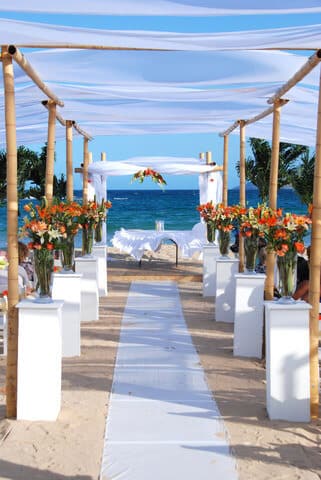
How Can Someone Not File for a Marriage License?
A case in New York’s Supreme Court in Manhattan this past May addresses exactly this issue. Ponorovskaya v. Stecklow centered on a couple that traveled to Mexico for their destination wedding. While at the resort, the couple was given information on the different types of ceremonies available to them, including civil, religious, or symbolic. Because of the rigorous requirements of performing a civil marriage ceremony in Mexico the couple decided to do only a symbolic ceremony with the intent of acknowledging the occasion. Had they chosen at least a civil ceremony, the marriage would at least have had legal standing under Mexican law.
You may be thinking it is strange to take no steps to legalize the marriage where it is performed, however this is not as rare you as may believe. Most couples that choose to have a destination wedding opt to file for a marriage license in New York either before or after the symbolic ceremony in the destination country. In Ponorovskaya v. Stecklow, however, the couple failed to take this step. Although they began the license application process upon their return from Mexico, they neglected to complete it and therefore were never issued a marriage license.
Naturally, you may be wondering how this happens. Couples may be operating under an incorrect assumption that a ceremony performed elsewhere is legally valid and therefore fail to take the proper steps upon return. However, the fact that this couple began the application process shows that they were at least somewhat aware the license was required, and there was no indication as to why they failed to complete it.
Are You Entitled to a Divorce if You Do Not Have a Marriage License?
The couple later sought a divorce, and that was what brought the case to court, as one partner claimed divorce was not an available remedy because there was no valid marriage. What the partner seeking the divorce sought to rely upon was Section 25 of New York’s Domestic Relations Law, which provides that a marriage without a license is void unless the parties have honored that marriage, and her statement that their marriage had been solemnized would entitle them to divorce proceedings in New York.
Before a determination of whether the marriage was in fact properly observed to fall within this exception, the court was left to determine whether DRL § 25 could be applied to marriage ceremonies performed outside of New York when those ceremonies do not produce marriages that are valid under the local laws.
The court dove into an analysis of the reach and purpose of DRL § 25. Although the court expressly noted that DRL § 25 is still in fact good law, it minimized its authority by stating that it is simply an antiquated law that the Legislature has merely overlooked. Of most importance here was the court’s refusal to apply DRL § 25 to the couple’s marriage ceremony in Mexico.
Out of what is clearly respect for the laws of other jurisdictions, and the desire that foreign couples do not come to New York for marriage ceremonies with the intention of skirting around appropriate laws of the state, the court held that it would not apply DRL § 25 in a manner that would “allow couples who embark on destination weddings the right to blithely ignore the clearly defined laws of a country in which they are guests.”
The court set a bright line rule by stating that while DRL § 25 may be (albeit rarely) applied to marriage ceremonies performed in New York, it is not applicable to ceremonies performed in foreign countries, and it is only applicable to ceremonies performed in other states under the most extraordinary circumstances.
What Does This Mean For Me?
If you had a destination wedding and failed to file for a marriage license either before or after the ceremony, it is important to discuss the specifics of the ceremony with your divorce attorney. Although other factors are taken into consideration when determining if DRL § 25 may be applied to an otherwise invalid marriage, the initial question that must be addressed is whether or not the ceremony was legally valid where it was performed.
Need Help? Contact the Long Island Divorce Lawyers at Robert E. Hornberger, Esq., PC
Not sure if your marriage is legally valid and you can get divorced on Long Island? Give us a call at 631-923-1910 or fill out the short form on this page for a complimentary (free) consultation. The compassionate and experienced divorce attorneys at Robert E. Hornberger, Esq., PC are knowledgeable on all aspects of divorce law as practiced in Nassau and Suffolk counties and throughout New York State.
For more information about Divorce on Long Island, visit this page: Divorce Lawyers Answer Questions about Long Island Divorce






